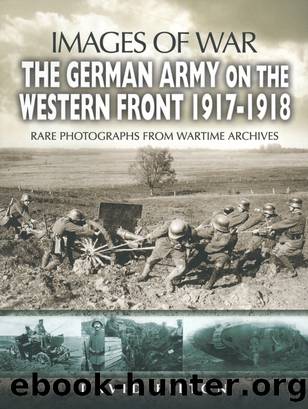The German Army on the Western Front, 1917â1918 by David Bilton

Author:David Bilton
Language: eng
Format: epub
ISBN: 9781473814592
Publisher: Pen & Sword Books
Officers of 142 Infantry Regiment near a guard point. Manpower was to be a significant factor in the coming assaults so much so that men with one arm could still be in the army â note the officer in the centre with the Blue Max around his neck.
A false gun position complete with fake gun to trick Allied photographic interpreters.
A decision now had to made about the best way forward; there were two options, Operation Hagen and Operation Roland; it was decided that first option was the better one. Ludendorff gave his approval and Hagen was scheduled for the end of July. Many senior officers realised that it could not be decisive, as Ludendorff hoped, because of the manpower shortage. With the amount of artillery and troop movement needed, as well as reinforcements to bring divisions up to strength, it became apparent that Hagen would be unable to start on the planned date and by mid-June it was apparent that Hagen was highly unlikely to happen.
Ludendorff had failed to provide the breakthrough that would end the war and, both at home and among many of the troops, there was a feeling of inevitability about the future; further attacks that would have initial gains but no breakthrough, allied counterattacks and all the time the butcherâs bill was getting bigger. On the home front physical lethargy was breeding mental despair. There were two overriding needs â food and peace. By May, food had become so scarce that, according to Princess Blücher, even the kangaroos in Berlin Zoo were slaughtered for their meat. In June, Berliners were limited to one pound of potatoes â often rotten â a week. Initially the food shortage had affected only the adults, who had been able to ensure that their children had enough food. Food was now so scarce in the towns that the children were as âthin and pale as corpsesâ, as one doctor recorded. But it was not just food that was in short supply: everything that was needed for everyday living was either unavailable, existed as an ersatz product or was so expensive only the rich could afford it. There was mounting resentment against the war profiteer and the black marketeer; both groups clearly evidence of a divided society. This inevitably led to a breakdown of discipline and order and an increase in violent crime and theft, particularly of food.
At home there had been random acts of sabotage and strikes that had badly affected military production and jeopardised the planned offensives. Even the victories did not alter the public feeling and, by May, with the offensive taking the troops to the Marne, the mood was one of apathy. Socialist and pacifist propaganda was also having its effect upon the peopleâs hopes and aspirations. People declared themselves âtired of sufferingâ. What they wanted was the return of their sons and husbands.
The Russian Revolution had left its mark on many soldiers who had been on the Eastern Front. Coupled with the discontent at home which percolated
Download
This site does not store any files on its server. We only index and link to content provided by other sites. Please contact the content providers to delete copyright contents if any and email us, we'll remove relevant links or contents immediately.
The Radium Girls by Kate Moore(10910)
The Templars by Dan Jones(4191)
100 Deadly Skills by Clint Emerson(4081)
Rise and Kill First by Ronen Bergman(4014)
The Doomsday Machine by Daniel Ellsberg(3734)
The Rape of Nanking by Iris Chang(3518)
Killing England by Bill O'Reilly(3458)
Hitler in Los Angeles by Steven J. Ross(3441)
Stalin by Stephen Kotkin(3088)
12 Strong by Doug Stanton(3059)
Hitler's Monsters by Eric Kurlander(2734)
Darkest Hour by Anthony McCarten(2649)
Blood and Sand by Alex Von Tunzelmann(2610)
The Art of War Visualized by Jessica Hagy(2413)
Hitler's Flying Saucers: A Guide to German Flying Discs of the Second World War by Stevens Henry(2297)
The Code Book by Simon Singh(2212)
The Second World Wars by Victor Davis Hanson(2136)
Babylon's Ark by Lawrence Anthony(2072)
Tobruk by Peter Fitzsimons(2063)
